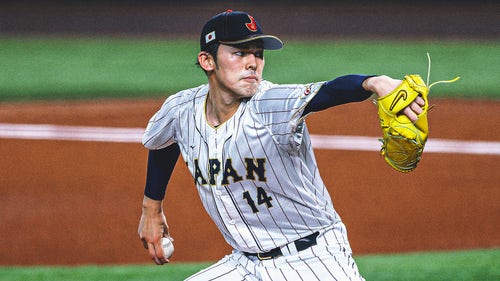
Alomar's paid his dues, put him in Hall
Roberto Alomar figures he’s done his penance, finished his term in Cooperstown-purgatory and, according to Twitter, the Internet and word of mouth among voters, the great second baseman will finally be elected into the Hall of Fame on Wednesday.
It’ll be a powerful moment for Alomar, his family and the Puerto Rican baseball community, which boasts only one other living member in the Hall (Orlando Cepeda). But Alomar’s coronation will also be tinged with injustice, as it will have taken him two ballots to get in. Shame on the Baseball Writers Association of America for passing over Alomar’s can’t-miss candidacy last year.
There’ve been few second basemen like Alomar throughout the game’s history — Ryne Sandberg, also a Hall of Famer, has a recent body of work that compares, but only as an also-ran. Among the current generation, Alomar sees a likeness in Robinson Cano’s style of play, but let’s see if the Yankee star can sustain his excellence for another 10 years or so.
The span of Alomar’s career was so breathtaking from 1988-2004, you need to include shortstops to give context to his achievements. Alomar is 11th all-time in hits among middle infielders, ninth in batting average, 11th in slugging percentage. Since 1950, only two middle infielders have had eight or more .300 seasons — Alomar and Derek Jeter.
So what’s held Alomar back? By numbers alone, Alomar should’ve easily exceeded the 75 percent threshold to be elected into the Hall last year. Any other candidate with similar achievements would’ve been in the 90 percent range.
But there’s actually no mystery here. Although Alomar has been accused by two women, including his wife, of being HIV positive, his Hall chances were more negatively impacted by the spitting incident with umpire John Hirschbeck in 1996. For that, Alomar’s legacy paid a heavy price — the asterisk that represented selfish, out of control behavior, a lack of respect for the game.
Those were blemishes that rightfully belonged on the back of Alomar’s baseball card. He accepted full blame for the incident and has apologized for the act — repeatedly — to the fans, the Orioles, team officials and, most importantly, to Hirschbeck. The fact that Alomar was forgiven by Hirschbeck should’ve been enough to clear his name, but he was nevertheless denied first-ballot entry into the Hall in 2010.
You don’t have to ask if it matters to players whether they enter Cooperstown in their first or 15th try. There’s a unique honor in being escorted to the front of the line — no different than any velvet-roped club. Players who have to wait and see their candidacies debated, year after year, on the Internet, while they explain, defend — and in some cases — plead their way in.
A year ago, Alomar figured he’d been spared that fate. He set up in the living room of his Long Island home, waiting until 1 p.m. for the final countdown to the announcement. A handful of friends gathered around Alomar’s wide-screen TV, fired up the MLB Network and sat through 60 minutes of torture.
“I was so sure,” Alomar said.
At least until 2 p.m., when it became obvious the phone wasn’t going to ring. In the meantime, Alomar had heard from then-Mets GM Omar Minaya, and Roberto Clemente Jr., both of whom had called to wish him luck. But by 2:05, Alomar realized the darker angels of his past were still in hot pursuit, still embarrassing him.
Of the 539 ballots returned, 134 didn’t bear Alomar’s name. Despite 12 All-Star selections, 10 Gold Gloves and a .300 career average, Alomar’s career was deemed below the Cooperstown standard. Yet, some knave in the BBWAA voted for Eric Karros on the same ballot.
“It was hard to understand,” Alomar said by telephone. “I mean, the numbers were there. I guess it’s part of life, taking the bad with the good, but I was in a state of shock. I tried to look at the bright side, that a lot of people did vote for me.”
Still, there were those 134 who didn’t, and for that, Alomar can only hope they’ve forgiven him the way Hirschbeck did. Immediately after the snub, the second baseman called Hirschbeck to say the friendship they’d forged in the past few years was still intact.
“I told John, 'this has nothing to do with you,'" Alomar said. “He sounded just as disappointed as me.”
Indeed, Hirschbeck has been campaigning on Alomar’s behalf for most of the past three years. He told the Baltimore Sun in 2010, “If I could vote, I would vote for (Alomar). I would love to see him go in."
Ironically, Alomar’s past has become a non-issue in 2011; almost everyone assumes he’ll be elected along with Bert Blyleven. The Hall’s freshest debate now centers on Jeff Bagwell, and whether his excellence in the steroid era should be penalized.
Alomar has told friends he has no intention of weighing in on Bagwell or any of the other sluggers who’ll soon stand before voters, including Barry Bonds. The way Alomar figures it, he’s had enough controversy for a lifetime, let alone a career.
That explains why Alomar has been under the radar in recent weeks. But ask anyone in his camp what that first-ballot triumph would’ve meant, and you get that arched-eyebrow, would’ve-been-nice expression that needs no other translation. Rightfully so. Alomar shouldn’t have had to wait.










